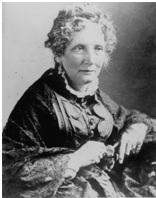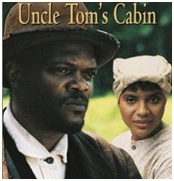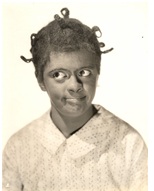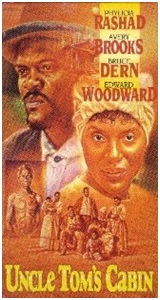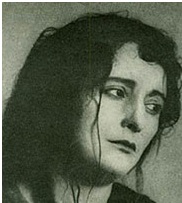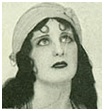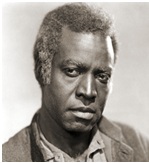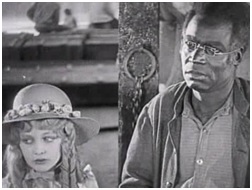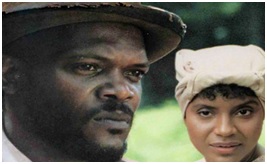|
 |
|
 |
|
|
||
Uncle Tom’s Cabin - Racism and Ethics
Uncle Tom’s Cabin (1852)
Written by the American, Harriet Beecher Stowe (1811-96), pictured right, and set in the early 1850’s.
Fun facts
It was the favourite book of...
1. Leo Tolstoy (writer of War and Peace) - pictured right.
2. Adolf Hitler. (the Nazi leader) - pictured right.
Key characters Uncle Tom, a good Christian slave in his late 40’s Arthur and Mrs Shelby, Tom’s owner in Kentucky and his wife George Shelby, Arthur’s son and Tom’s friend Eliza, Mrs Shelby’s maid Augustine St. Clare, Tom’s owner in New Orleans Eva, St Clare’s daughter Ophelia, St Clare’s cousin Simon Legree, Tom’s owner in Louisiana Cassy, a slave.
The story In the early 1850’s, the money problems of the kind slave owner, Arthur Shelby, threaten his Kentucky farm. Much to his wife’s disgust, he sells two slaves to Mr Haley the slave trader:
Eliza finds out and warns Uncle Tom (pictured right in the 1987 film with Cassy - see below). Although Tom stays behind out of loyalty to his new master, Eliza flees to the North (where blacks are free) with Harry. Chased by Haley and his men, they miraculously cross the frozen Ohio River (separating Kentucky from the North). Eliza and Harry are helped by:
After Eliza is reunited with her husband,George (who has also escaped), the Quakers help
them to escape to Canada before Haley's slave hunters, Tom Loker and Mr.
Marks, can capture them. Uncle Tom is taken away on the Mississippi steamboat to be sold, sadly leaving behind his:
Uncle Tom saves a five-year-old white girl, Eva St Clare, from drowning and her grateful father Augustine St. Clare buys him for their home in New Orleans. Uncle Tom is happy there and becomes particularly close to Eva, who is a devout Christian like him. Augustine helps his cousin, Ophelia, to overcome her deep prejudice against blacks by buying her an abused slave, Topsy (pictured right above in the 1927 film), to educate. Eva grows very ill and dies, inspiring Ophelia, Topsy and her father to love everyone, black or white. Augustine decides to free Tom (Eva's dying request) but, before he can do so, he is killed trying to settle a
brawl. Augustine's cruel wife, Marie, sells Tom to a vicious plantation owner in Louisiana, Simon Legree. Emmeline is also bought to replace another slave ,Cassy, as Legree's mistress. Cassy:
Uncle Tom steadfastly:
Uncle Tom dies, forgiving Legree. Too late, George Selby arrives with money to buy Tom’s freedom, but he helps Emmeline and Cassy in their escape. Cassy discovers that Eliza is her long lost daughter. Cassy (pictured right below in the 1927 film), and Emmeline travel to Canada, where they meet Eliza, George and Harry. They all decide to live in Liberia, the African country created for former American slaves. George Shelby:
He tells them to:
Lessons for racism and ethics
1. Morality before legality Slavery is evil and so must be fought, even if it is legal (as it was in the Southern states). The book shows the cruelty of slavery, leading to:
Senator Bird and his wife help Eliza and Harry in Ohio, even though it is illegal to assist fugitive slaves. Eliza (Margarita Fischer) is pictured right in the 1927 film. 2. The importance of love Tom has enough humility to:
Tom (James Lowe) is pictured right in the 1927 film.
3. Integrity inspires people Uncle Tom’s character inspires George Shelby to beg for the freedom of the slaves at his father’s farm. Tom Loker’s life is transformed by the love of the Quaker settlement that heals him physically and spiritually.
4. It’s never too late to change Ophelia loses her racial prejudice through:
This shows Ophelia that black people are equal human beings. 5. Faith is fantastic Tom and Eva’s faith in God helps them become better people. Tom keeps his faith, despite:
Tom (James Lowe) and Eva (Virginia Grey) are pictured right in the 1927 film.
6. Motivate people by treating them well One slave owner treats his slaves so well (like “men” not “dogs”) that they don’t run away . Arthur Shelby also gets the best from Tom by totally trusting him. Tom (Avery Brooks) and Cassy (Paula Kelly) are pictured right in the 1987 film
7. Principle before profit The book shows the depravity of:
The evil slave trader, Mr. Haley, forces Arthur Selby to also give him Harry, Eliza's young son, for the price he paid for Tom.
Key quotes on leadership and management The number of those men who know how to use wholly irresponsible power humanely and generously is small. Everybody knows this, and the slave knows it best of all.
Key quote on ethics There is one thing that every individual can do – they can see to it that they feel right.
Key quote on business ethics I’ve got just as much conscience as any man in business can afford to keep, Mr. Haley
Key quote on workers I’ll give ye all the work of my hands ... but my soul I won’t give up, Tom (to Legree, on refusing to beat another slave)
Two literature websites to recommend 1. sparknotes.com 2. litcharts.com
|
|
|
||
|
|
||
| Copyright © wisdomtowin.com 2025 All Rights Reserved | ||
|


